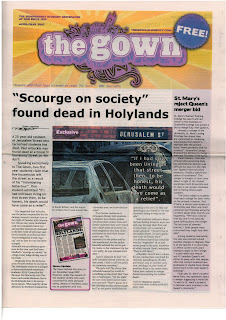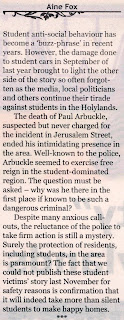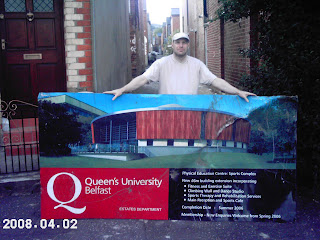This means that one can get a degree without ever leaving home. No more need for student accommodation. No more need to move to Belfast. What justification do they have now? Those inbred yokels flood into the Holyland like a Tidal Wave of Excrement. Yet they don't go to class, so tuition fees are wasted. They regurgitate their notes onto the exam paper just like they were taught in grammar school. They are simply a grotesque waste of taxpayers money. This does not bother their parents who, after all, enjoy unearned wealth and privilege courtesy of the UK taxpayer. Oddly they claim to oppose the Union, much in the same way, I suppose, as a high class whore claims to oppose prostitution. A short anecdote describes perfectly their hypocrisy. I found myself chatting to the occupants of a expensive car; the father in a dark suit; mother conservatively dressed; both middle aged, middle class parents, their demeanour dignified and restrained. In the back sits their daughter, laughing through her fake tan,
"We're movin' in on Monday!!! Party!!!!!!!!!!"
Mum and dad are unmoved, unphased. For them there is nothing wrong. I slap my hand on my head and say,
"Thank fuck I'm leaving"
Correspondence study enables those who are repulsed at the well earned stigma of our local universities to get an education without leaving here. Lectures can be made available on line or on DVD. It's just like the Open University only dearer. Someone should have thought of it sooner.
Uni offers cut-price degrees in north
By Simon Doyle Education Correspondent27/05/08
STUDENTS are being offered the chance to earn cut-price degrees from an English university without having to leave Northern Ireland.
Plans to develop a US-style state college network using the north’s further education (FE) institutions are being brought forward by Leeds Metropolitan University.
The scheme will allow FE students to work towards higher qualifications while saving thousands of pounds in accommodation, travel and fees.
Accredited degrees can be earned for around £1,000 a year less than it would cost to study at either of Northern Ireland’s two universities.
Leeds Met is offering its courses through Belfast Metropolitan College and is working to develop links with other colleges.
The university already has a strong association with the north – its Carnegie faculty of sport and education sponsors Irish League, women’s and schools’ cup soccer.
It said it now hopes to encourage more people in Northern Ireland to continue their studies by making degrees more accessible and affordable.
Leeds Met was the first university to announce it would charge less than the maximum ‘top-up’ tuition fees when the controversial new system was introduced.
Top-up fees – blamed for adding to record levels of student debt – are set to rise from £3,000 to £3,145 a year in line with inflation but courses at Leeds Met have a price tag of £2,000.
Its expanding partnership with the north’s FE colleges gives students, for the first time, the opportunity to avail of cheaper degrees without having to move to England.
With transport and other costs rising, this may be also attractive for many as it will mean saving on accommodation and travel.
Vice-chancellor Simon Lee, a former dean of the School of Law at Queen’s University Belfast, said the relationship between Leeds Met and the north’s colleges was “evolving”.
“We should be like an American state university. We are not trying to be a research university. We are trying to be like the University of Texas, Wisconsin or California, where there are different campuses and different community colleges,” he said.
“The regional college network sees the value of the partnership and we like the idea of students who might have stopped at that stage of their education feeling confident and wanting to keep progressing.”
Students can study for foundation degrees – in subjects including marketing and media technology – in colleges for two years.
They can then either transfer to Leeds or stay at home for an extra year to earn a full degree.
Prof Lee said while the collaboration was still in its infancy he predicted that more students would earn their degrees without moving to Leeds.
“It is possible for students never to leave home,” he said.
University Leeds way in forging new links
By Simon Doyle Education Correspondent27/05/08
Having already developed strong links with Northern Ireland through sport, a university in England is now seeking to expand the range of academic opportunities open to students. Education correspondent Simon Doyle reports
When Professor Simon Lee, a one-time dean of the law faculty at Queen’s University Belfast, was appointed head of Liverpool Hope University he sought to boost the number of Irish students on campus.
His Hope Across the Irish Sea campaign saw the undergraduate total from both north and south rise from a tiny proportion to the 1,000 that attend the university today.
Prof Lee said Liverpool was a natural place for young people from Ireland to study while Hope itself also offered a small town charm attractive to those from rural areas.
Now as vice-chancellor of Leeds Metropolitan University, Prof Lee is again looking to his former home.
His university’s Carnegie brand is already well-established in sport in the north and he is seeking to expand the university’s role in further and higher education.
“It is obviously more of a difficult proposition than Liverpool because it hasn’t got the historical and romantic attachment. It hasn’t got the proximity and didn’t have the communications,” Prof Lee said.
“When I came I did not want to do what I did at Hope, so for the first year I don’t think we did very much at all about Northern Ireland.
“At the end of that first year, Bradford City football club got into difficulties and I suggested that we see if we can help.”
Leeds Met began delivering sport science support to Bradford City FC and then the following year while attending the British-Irish Association annual conference he learned that the Irish League was seeking a new
sponsor.
After discussions between the university and IFA chief executive Howard Wells, a former student at the Carnegie faculty of sport and education, it was agreed that the name of the faculty would be used to sponsor the league.
“From the beginning we were clear that we wanted to help but it would give us a profile in and across Northern Ireland,” Prof
Lee said.
“It’s not a commercial sponsorship and it is not like an average university somewhere in Scotland or England deciding randomly to try and recruit students from Northern Ireland.
“There is a real human relationship at all sorts of levels through the university.
“We have a real opportunity to develop relationships with schools, young people, their families and we are not just trying to recruit anybody and everybody.”
The university has also launch-ed a new partnership with Rugby League Ireland which will see players benefit from Carnegie’s sporting expertise in developing players, coaches and officials.
Prof Lee said Leeds Met had also forged strong cultural and academic partnerships and had developed links with about 20 different colleges across “the north of these islands” – including Hull, Grimsby, Belfast and Derry.
He said the relationship with Northern Ireland colleges was “evolving”.
“We should be like an American state university. We are not trying to be a research university. We are trying to be like the University of Texas, Wisconsin or California, where there are different campuses and different community colleges,” Prof Lee said.
“In America you might study two years at your local community college and then decide you want to go on to the big city in your state.
“In England the government introduced foundation degrees and that has now rippled out through the rest of these islands and the model is two years and one year for topping up.”
Prof Lee said the initial idea was for Further Education colleges to teach the two-year foundation degrees, with students then travelling to Leeds to top-up to a full degree in their third year.
However, he said that this had changed because the British government was giving colleges the power to award their own foundation degrees.
“In general the regional college network sees the value of the partnership and we like the idea of students who might have stopped at that stage of their education feeling confident and wanting to keep progressing,” Prof Lee said.
“It is a very gradual process. We are dealing with the north – the north of Ireland, the north of England and Scotland.”
A college that Leeds Met has strong links with in Dunfermline, formerly known as Lauder College, has changed its name to Carnegie College.
Prof Lee said he could see one of the north’s institutions making a similar name change.
Among the Leeds degree courses offered through Belfast Metropolitan University is the BA (Hons) in Marketing.
“In principle you can do the degree in anything,” Prof Lee said.
“What tends to happen is a college develops a course for its local economy. Probably what would happen would be students going for a more generic top-up year such as in enterprise.
“If you are going to widen
participation in the north of Ireland, you have often got to hook a youngster or a returning- to-learning person into something they feel very confident in. You take them through to foundation degree and then you branch out.”
Prof Lee said the relationship was still in its infancy and he believed that more students would choose the distance-learning option.
“It is possible for them never to leave home,” he said.
“The numbers are too small to say what the pattern will be, but I think it will mostly be staying at home.”
Suzie Gray, head of higher education at Belfast Metropolitan College, said the collaboration contributed to the continued professional development of college staff, which in turn benefited students.
“Our strategic partnership with Leeds Metropolitan University not only provides opportunities for curriculum development within the college, it provides our students with progression opportunities here in Northern Ireland, thereby increasing the likelihood that they will forge their career closer to home and make a longer-term contribution to the local economy,” she said.



